By Leen Randell
Updated: Jul 04, 2024
10 Best Herbal Decoctions For Knee Swelling
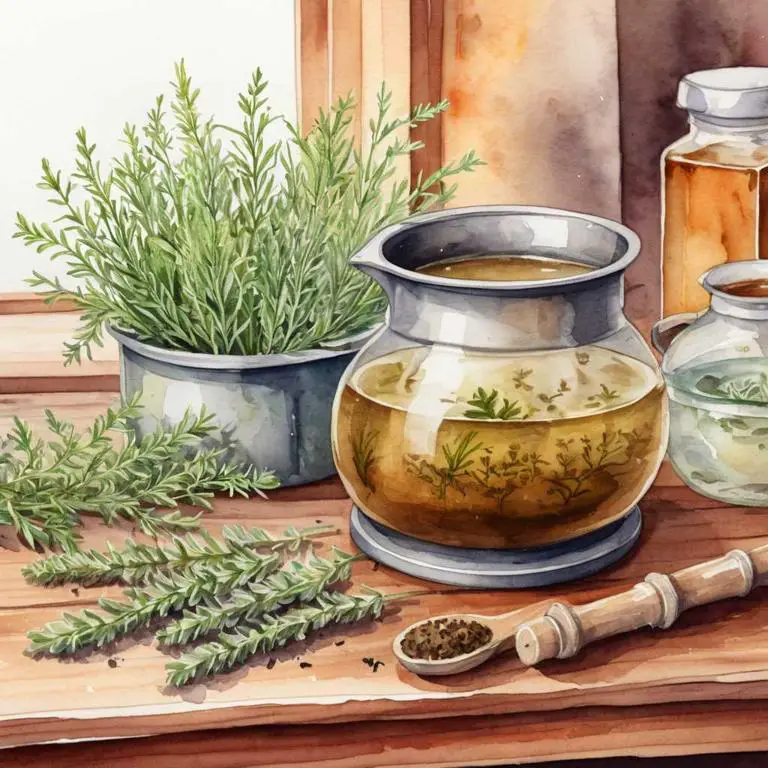
Herbal decoctions for knee swelling are a natural and effective way to alleviate pain, inflammation, and stiffness associated with knee joint issues.
These decoctions are made by steeping herbs in hot water, allowing the active compounds to infuse and provide relief from discomfort. Turmeric and ginger are two examples of herbal decoctions that have anti-inflammatory properties, helping to reduce swelling and promote healing.
By incorporating these decoctions into their daily routine, individuals can improve mobility, reduce pain, and regain independence, enabling them to resume their normal activities with greater ease and confidence.
The following article describes in detail the most important decoctions for knee swelling, including medicinal properties, parts of herbs to use, and recipes for preparations.
- 1. Curcuma longa
- 2. Salix alba
- 3. Zingiber officinale
- 4. Boswellia serrata
- 5. Harpagophytum procumbens
- 6. Withania somnifera
- 7. Capsicum annuum
- 8. Hypericum perforatum
- 9. Filipendula ulmaria
- 10. Althaea officinalis
- What is the best combination of herbal decoctions to use for knee swelling?
- What ailments similar to knee swelling are treated with herbal decoctions?
1. Curcuma longa
Turmeric decoctions helps with knee swelling because of its potent anti-inflammatory properties, particularly curcumin.
When combined with other herbs, such as ginger and devil's claw, these decoctions can effectively reduce joint inflammation and pain. The antioxidants and bioactive compounds in turmeric help to block the production of prostaglandins, which are hormone-like substances that cause swelling and pain.
Additionally, turmeric's natural anti-inflammatory properties also help to improve joint mobility and flexibility, reducing stiffness and discomfort associated with knee swelling.
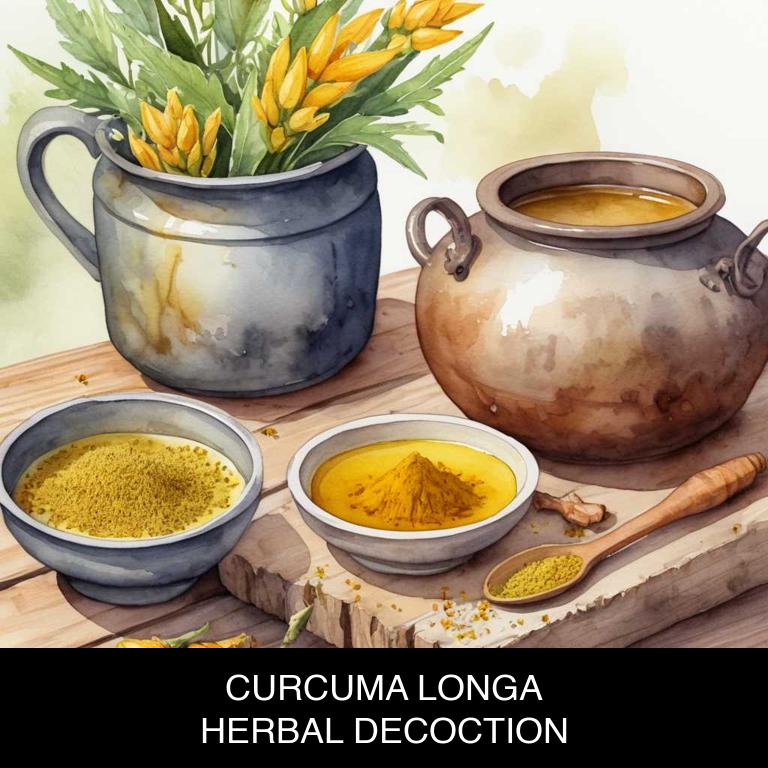
Medicinal Constituents
The list below shows the primary medicinal constituents in Curcuma longa decoctions that help with knee swelling.
- Curcumin: A polyphenolic compound with potent anti-inflammatory and antioxidant properties, which helps reduce knee swelling by inhibiting the production of pro-inflammatory enzymes and cytokines.
- Demethoxycurcumin: A phenolic compound with similar anti-inflammatory and antioxidant properties to curcumin, which contributes to reducing knee swelling by preventing the activation of inflammatory pathways.
- Beta-diketone: A terpenoid compound that exhibits anti-inflammatory and antioxidant properties, which helps alleviate knee swelling by inhibiting the production of pro-inflammatory mediators and protecting against oxidative stress.
Parts Used
The list below shows the primary parts of turmeric used to make decoctions for knee swelling.
- Rhyzomes: Rhyzomes are commonly used due to their high content of curcumin, a bioactive compound with anti-inflammatory properties.
- Roots: Roots are another commonly used part, as they contain curcumin and other compounds that help reduce inflammation and relieve knee swelling.
- Stems: Stems are sometimes used, as they contain lower amounts of curcumin but still have anti-inflammatory properties that can help alleviate knee swelling.
Quick Recipe
The following recipe gives a procedure to make a basic turmeric for knee swelling.
- Gather 1 teaspoon of dried curcuma longa rhizome and 2 cups of water for the decoction.
- Boil the water in a saucepan and add the dried rhizome for 10 to 15 minutes.
- Reduce heat to low and simmer for another 5 to 10 minutes to release the active compounds.
- Strain the mixture through a cheesecloth or a fine-mesh sieve into a clean container.
- Discard the solids and store the decoction in the refrigerator for up to 24 hours.
2. Salix alba
White willow decoctions helps with knee swelling because they contain salicin, a natural compound similar to aspirin that reduces inflammation and pain.
When used as a topical application or taken orally, salicin works to block the production of prostaglandins, which are hormone-like substances that cause blood vessels to dilate and lead to swelling.
By reducing these hormonal responses, white willow decoctions can help alleviate knee swelling and discomfort associated with conditions such as osteoarthritis, allowing for improved mobility and reduced pain.
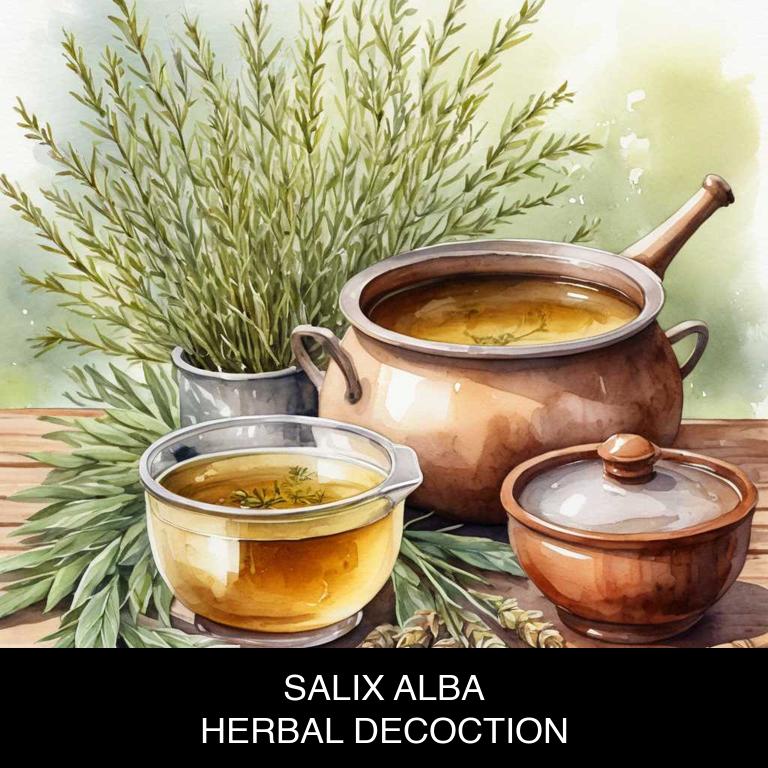
Medicinal Constituents
The list below shows the primary medicinal constituents in Salix alba decoctions that help with knee swelling.
- Salicylic acid: It helps with knee swelling by reducing inflammation and pain due to its analgesic and anti-inflammatory properties, which are similar to aspirin.
- Phenolic acids: They contribute to the anti-inflammatory and analgesic effects of Salix alba decoctions, thereby reducing swelling and pain in the knees.
- Flavonoids: They exhibit anti-inflammatory and antioxidant properties, which can help reduce inflammation and oxidative stress that contribute to knee swelling.
Parts Used
The list below shows the primary parts of white willow used to make decoctions for knee swelling.
- Leaves: They possess analgesic and anti-inflammatory properties, which help alleviate knee swelling and discomfort.
- Roots: The roots of Salix alba contain compounds that help reduce inflammation and promote healing in the affected area.
Quick Recipe
The following recipe gives a procedure to make a basic white willow for knee swelling.
- Harvest fresh salix alba bark in the spring or fall for optimal potency and medicinal properties.
- Dry the freshly harvested salix alba bark in a warm place for 7 to 10 days to reduce moisture content.
- Chop the dried salix alba bark into small pieces to increase its surface area for infusion.
- Combine one teaspoon of chopped salix alba bark with 250 milliliters of boiling water in a saucepan to prepare the decoction.
- Allow the decoction to simmer for 10 to 15 minutes over low heat to extract its medicinal compounds.
3. Zingiber officinale
Ginger decoctions helps with knee swelling because of its potent anti-inflammatory properties, which help to reduce joint pain and stiffness.
The decoction's active compounds, such as gingerol and shogaol, work by inhibiting the production of pro-inflammatory cytokines, thereby reducing inflammation in the affected joints. Additionally, ginger's natural warming properties help to increase blood flow to the area, promoting healing and reducing swelling.
This natural remedy has been used for centuries to provide relief from knee pain and swelling, making it a popular alternative to traditional medications.
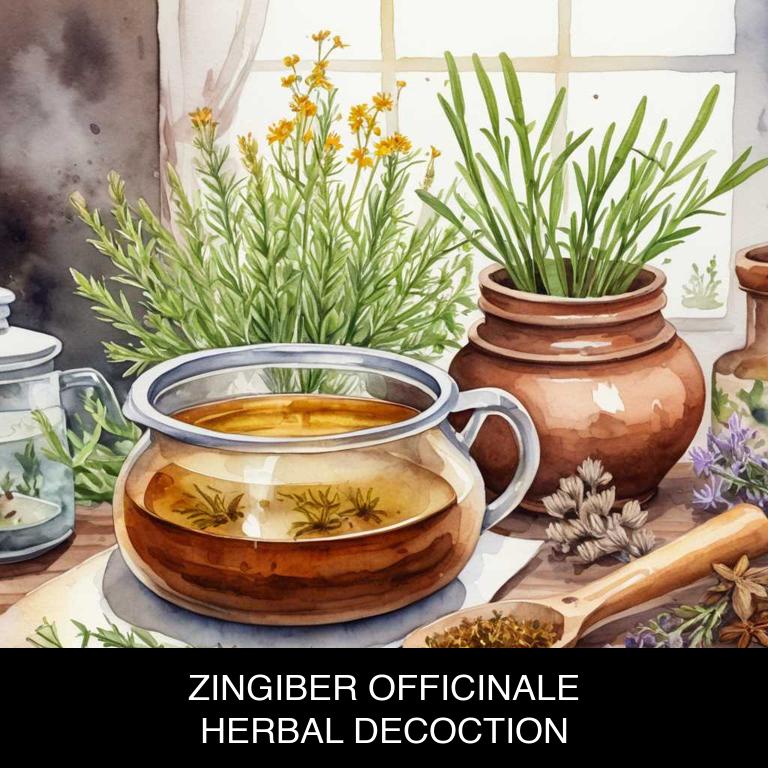
Medicinal Constituents
The list below shows the primary medicinal constituents in Zingiber officinale decoctions that help with knee swelling.
- Gingerols: These are a type of sesquiterpene responsible for the anti-inflammatory properties of ginger, which help reduce swelling and pain in the knees by inhibiting the production of pro-inflammatory enzymes.
- Shogaols: Similar to gingerols, shogaols are also sesquiterpenes that contribute to ginger's anti-inflammatory effects, helping to alleviate knee swelling by reducing inflammation and pain-causing chemicals in the body.
- 6-gingerol: As a major bioactive compound in ginger, 6-gingerol has been shown to possess potent anti-inflammatory and antioxidant properties, which help to reduce knee swelling and alleviate pain by blocking the activity of enzymes that contribute to inflammation.
Parts Used
The list below shows the primary parts of ginger used to make decoctions for knee swelling.
- Rhyzomes: Rhyzomes are commonly used because they are rich in gingerols and shogaols, compounds that have anti-inflammatory properties.
- Barks: Barks are used due to their ability to release volatile oils that help reduce pain and inflammation in the knees.
- Roots: Roots are utilized for their high content of bioactive compounds that have anti-inflammatory and antioxidant effects, which help alleviate knee swelling.
Quick Recipe
The following recipe gives a procedure to make a basic ginger for knee swelling.
- Harvest 2-3 fresh or dried rhizomes of zingiber officinale for a decoction.
- Chop the rhizomes into small pieces with a sharp knife or grater.
- Combine 1 teaspoon of the chopped rhizomes with 1 cup of boiling water in a saucepan.
- Simmer the mixture for 5-7 minutes over low heat to release the active compounds.
- Strain the decoction through a fine-mesh sieve or cheesecloth into a cup.
4. Boswellia serrata
Frankincense decoctions helps with knee swelling because they contain potent anti-inflammatory compounds that directly target the affected area.
The decoction's active ingredients, such as boswellic acids and sesquiterpenes, work to reduce inflammation and alleviate pain associated with arthritis and joint trauma.
By reducing swelling and inflammation, frankincense decoctions enable improved joint mobility and function, providing relief from knee discomfort and stiffness.
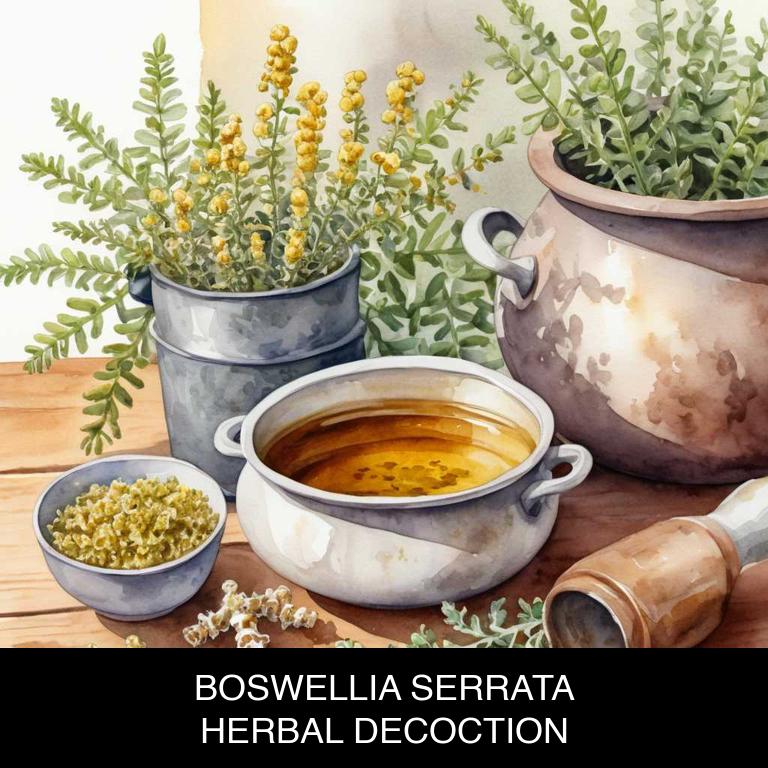
Medicinal Constituents
The list below shows the primary medicinal constituents in Boswellia serrata decoctions that help with knee swelling.
- Boswellic acids: These triterpenoid acids have anti-inflammatory properties, which help reduce swelling and pain in the knees by inhibiting the production of pro-inflammatory enzymes.
- Acuminatin: This triterpenoid saponin has anti-inflammatory and antioxidant properties, which help reduce knee swelling by inhibiting the production of pro-inflammatory cytokines and free radicals that contribute to inflammation.
- 3-acetyl-11-keto-beta-boswellic acid: This boswellic acid has potent anti-inflammatory and analgesic properties, which help reduce knee swelling and pain by inhibiting the production of pro-inflammatory enzymes and blocking pain pathways in the nervous system.
Parts Used
The list below shows the primary parts of frankincense used to make decoctions for knee swelling.
- Roots: The roots are the most commonly used part due to their high concentration of boswellic acids, which are responsible for their anti-inflammatory properties.
- Rhyzomes: The rhyzomes are also used due to their similar composition to roots, providing a consistent source of boswellic acids for therapeutic benefits.
- Barks: The barks of Boswellia serrata are occasionally used to make decoctions, offering a slightly different profile of boswellic acids compared to roots and rhyzomes, but still providing anti-inflammatory benefits.
Quick Recipe
The following recipe gives a procedure to make a basic frankincense for knee swelling.
- Measure 1-2 teaspoons of dried boswellia serrata resin and place it in a small saucepan.
- Add 4 cups of water to the saucepan and bring it to a boil over high heat.
- Reduce the heat to low and simmer the mixture for 10-15 minutes or until the liquid is reduced by half.
- Strain the decoction through a cheesecloth or a fine-mesh sieve into a cup or a glass container.
- Store the boswellia serrata decoction in the refrigerator for up to 3 days and take 1-2 tablespoons as needed.
5. Harpagophytum procumbens
Devil's claw decoctions helps with knee swelling because of its unique combination of bioactive compounds, particularly harpagoside and beta-amyrin.
These natural constituents have potent anti-inflammatory and analgesic properties that work together to reduce knee swelling by inhibiting prostaglandins and reducing the production of cytokines.
Additionally, devil's claw decoctions also possess antioxidant and immunomodulatory activities, which further contribute to its ability to alleviate knee swelling and related discomforts associated with conditions such as osteoarthritis.
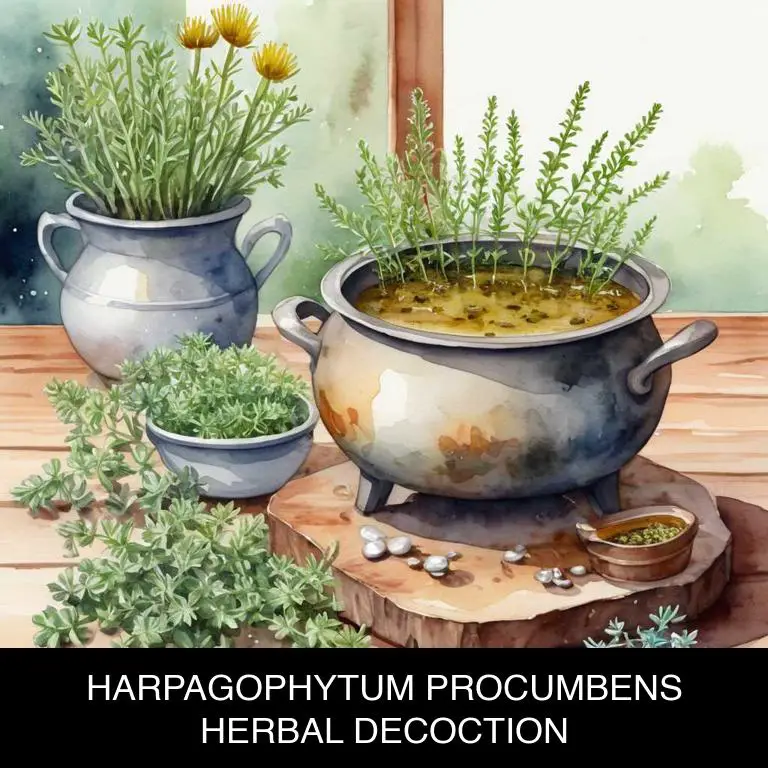
Medicinal Constituents
The list below shows the primary medicinal constituents in Harpagophytum procumbens decoctions that help with knee swelling.
- Harpagoside: This iridoid glycoside is responsible for the anti-inflammatory and pain-relieving properties of Harpagophytum procumbens, helping to reduce knee swelling by inhibiting the production of pro-inflammatory mediators.
- Procumbideside: This iridoid glycoside has been shown to possess anti-inflammatory and antioxidant properties, which contribute to the reduction of knee swelling and associated pain by neutralizing free radicals and reducing inflammation.
- Harpagoside-8-acetate: This iridoid glycoside has been found to exhibit anti-inflammatory and immunomodulatory effects, helping to alleviate knee swelling by modulating the immune response and reducing the production of pro-inflammatory cytokines.
Parts Used
The list below shows the primary parts of devil's claw used to make decoctions for knee swelling.
- Roots: The roots are the primary source of Harpagophytum procumbens extracts due to their high concentration of bioactive compounds such as harpagoside.
- Rhyzomes: Rhyzomes are used to make decoctions as they contain a similar composition of bioactive compounds as the roots, providing anti-inflammatory and pain-relieving properties.
- Stems: Stems are also used, although to a lesser extent, to make decoctions, as they contain smaller amounts of harpagoside and other beneficial compounds that can aid in reducing knee swelling.
Quick Recipe
The following recipe gives a procedure to make a basic devil's claw for knee swelling.
- Harvest fresh or dried roots of harpagophytum procumbens and clean them thoroughly in cold running water for 2 minutes.
- Weigh 5-10 grams of the cleaned roots for a standard decoction and add them to a pot.
- Pour 1 liter of cold water over the roots in the pot and bring the mixture to a boil on high heat.
- Reduce the heat to low and let the decoction simmer for 10-20 minutes or until the liquid is reduced by half.
- Strain the decoction through a cheesecloth or a fine-mesh sieve into a clean container to remove the solids.
6. Withania somnifera
Ashwagandha decoctions helps with knee swelling because of its potent anti-inflammatory properties.
The decoction's bioactive compounds, such as withanolides and alkaloids, work to reduce prostaglandins and leukotrienes, which are known to contribute to inflammation and swelling in the knees. Additionally, ashwagandha's antioxidant properties help to neutralize free radicals that can exacerbate knee swelling.
By reducing inflammation and oxidative stress, ashwagandha decoctions can provide relief from knee swelling and discomfort, making it a natural remedy for individuals seeking alternative treatments.
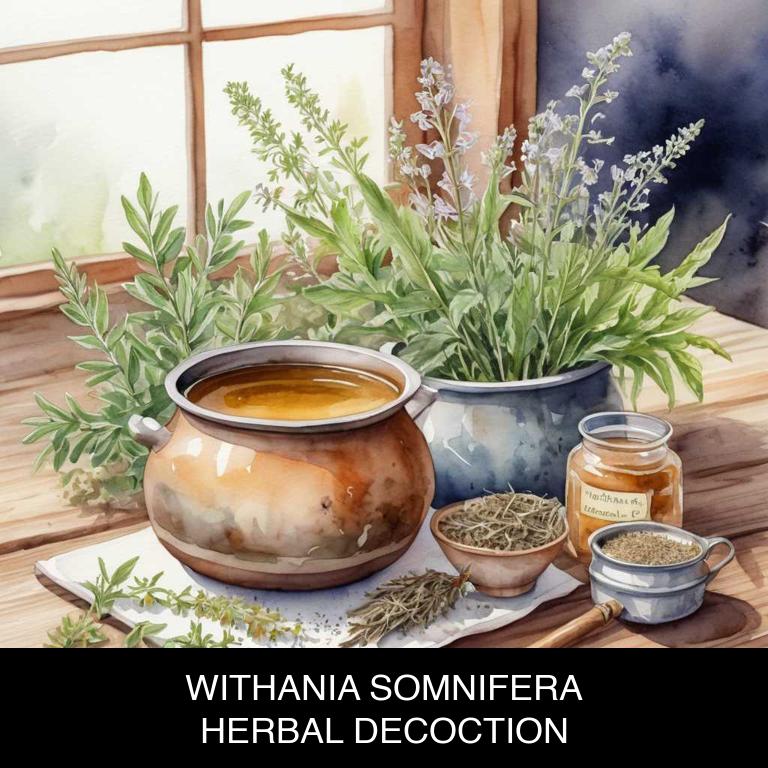
Medicinal Constituents
The list below shows the primary medicinal constituents in Withania somnifera decoctions that help with knee swelling.
- Withanolides: These steroidal lactones have anti-inflammatory properties, which help reduce knee swelling by inhibiting the production of pro-inflammatory enzymes and cytokines.
- Withaferin a: This bioactive compound exhibits potent anti-inflammatory and antioxidant activities, which contribute to reducing knee swelling by scavenging free radicals and inhibiting the activity of inflammatory mediators.
- Caffeic acid: As a phenolic compound, caffeic acid has anti-inflammatory properties, which help alleviate knee swelling by inhibiting the production of pro-inflammatory enzymes and reducing the activity of inflammatory cells.
Parts Used
The list below shows the primary parts of ashwagandha used to make decoctions for knee swelling.
- Roots: They are primarily used due to their high concentration of bioactive compounds that help in reducing inflammation and swelling.
- Leaves: They are often used as they contain a significant amount of withanolides, which have anti-inflammatory and analgesic properties.
- Barks: They are sometimes used due to their ability to reduce inflammation and pain, which can contribute to the alleviation of knee swelling.
Quick Recipe
The following recipe gives a procedure to make a basic ashwagandha for knee swelling.
- Harvest 20-30 grams of dried roots of withania somnifera from a reliable source.
- Weigh out 1-2 teaspoons of the harvested roots for each decoction.
- Combine the weighed roots with 250ml of boiling water in a heat-resistant container.
- Simmer the mixture for 10-15 minutes or until the liquid has reduced slightly.
- Strain the decoction using a cheesecloth or a fine mesh sieve and discard the solids.
7. Capsicum annuum
Bell pepper decoctions helps with knee swelling because it possesses potent anti-inflammatory properties that effectively reduce joint pain and stiffness.
The decoction's bioactive compounds, such as capsicum and antioxidants, work synergistically to block inflammatory enzymes, thus alleviating swelling and discomfort in the knees. Additionally, bell peppers contain natural analgesics that soothe and calm irritated tissues, promoting a smoother recovery from knee injuries or conditions like arthritis.
This ancient remedy has been used for centuries to provide relief and improve joint mobility.
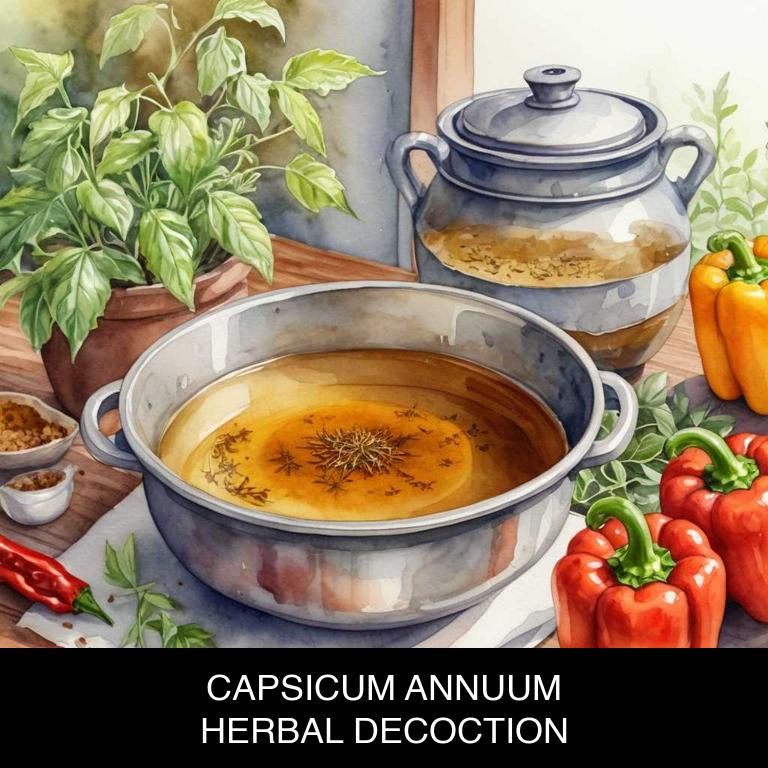
Medicinal Constituents
The list below shows the primary medicinal constituents in Capsicum annuum decoctions that help with knee swelling.
- Capsaicin: Capsaicin helps with knee swelling by reducing inflammation and pain through its inhibition of substance P, a neurotransmitter that transmits pain signals to the brain.
- Quercetin: Quercetin helps with knee swelling by acting as an antioxidant and anti-inflammatory compound, reducing the production of pro-inflammatory enzymes and cytokines that contribute to swelling and pain.
- Ellagic acid: Ellagic acid helps with knee swelling by exhibiting anti-inflammatory properties, inhibiting the production of pro-inflammatory enzymes and cytokines, and scavenging free radicals that contribute to oxidative stress and inflammation.
Parts Used
The list below shows the primary parts of bell pepper used to make decoctions for knee swelling.
- Fruits: Used for their anti-inflammatory and analgesic properties to reduce knee swelling.
- Leaves: Used for their anti-inflammatory and antioxidant properties to help reduce inflammation and promote healing in knee joints.
- Seeds: Used for their anti-inflammatory and analgesic properties to reduce pain and swelling in knee joints.
Quick Recipe
The following recipe gives a procedure to make a basic bell pepper for knee swelling.
- Harvest 10-20 fresh capsicum annuum fruits, wash them thoroughly with clean water to remove any dirt or debris.
- Chop the capsicum annuum fruits into small pieces, using a sharp knife to release their active compounds.
- Boil 500ml of water in a saucepan, then reduce the heat to a simmer for 10-15 minutes.
- Add the chopped capsicum annuum pieces to the boiling water, allowing them to steep for 30-60 minutes.
- Strain the decoction through a cheesecloth or a fine-mesh sieve into a clean container, discarding the solids.
8. Hypericum perforatum
St John's wort decoctions helps with knee swelling because it contains hyperforin, a bioactive compound that has anti-inflammatory properties.
When consumed as a tea, the hyperforin in St John's wort is absorbed into the bloodstream and reaches the affected area of the body, where it reduces inflammation and alleviates pain and discomfort associated with knee swelling.
Additionally, St John's wort decoctions have been shown to improve circulation and reduce edema, further contributing to its effectiveness in reducing knee swelling.
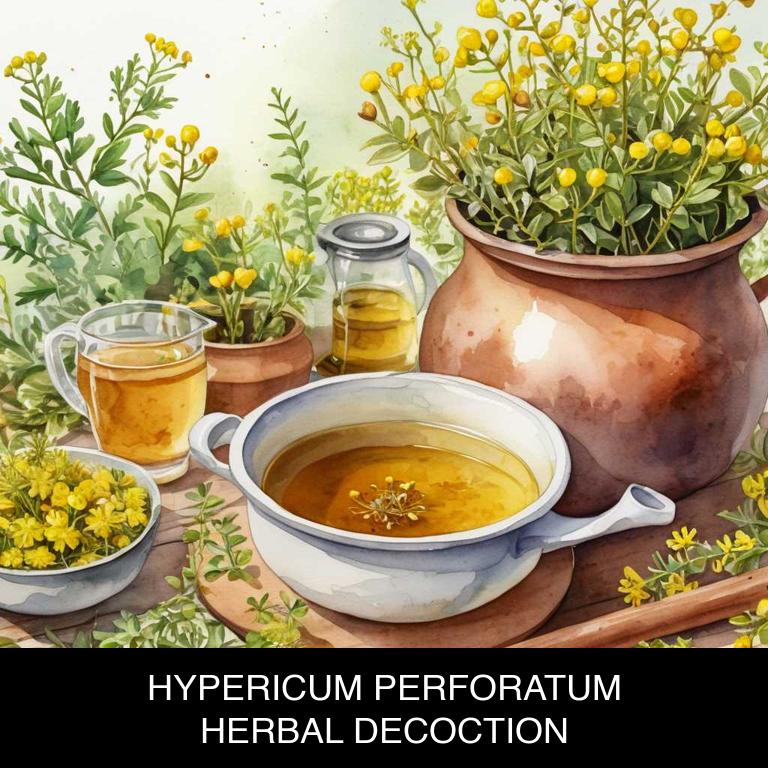
Medicinal Constituents
The list below shows the primary medicinal constituents in Hypericum perforatum decoctions that help with knee swelling.
- Hyperforin: A prenylated phenolic compound that reduces inflammation and oxidative stress in the body, which can contribute to knee swelling.
- Nortriptyline: An alkaloid that has analgesic, anti-inflammatory, and antispasmodic properties, helping to alleviate pain and discomfort associated with knee swelling.
- Quercetin: An antioxidant that has anti-inflammatory properties, which can help to reduce swelling and inflammation in the knee joint.
Parts Used
The list below shows the primary parts of st john's wort used to make decoctions for knee swelling.
- Leaves: They are rich in flavonoids and other compounds that have anti-inflammatory properties, which can help alleviate knee swelling.
- Flowers: They contain flavonoids and other active compounds that can help reduce inflammation and relieve knee swelling.
- Roots: They are rich in hyperforin and other compounds that have anti-inflammatory and antioxidant properties, which can help treat knee swelling.
Quick Recipe
The following recipe gives a procedure to make a basic st john's wort for knee swelling.
- Gather 1 part dried hypericum perforatum flowers and 2 parts water in a saucepan.
- Boil the mixture for 5 to 10 minutes over medium heat.
- Reduce heat to low and let simmer for 30 minutes.
- Strain the liquid through a cheesecloth into a cup and discard solids.
- Drink 1 cup of the decoction 2 to 3 times a day as needed.
9. Filipendula ulmaria
Meadowsweet decoctions helps with knee swelling because of its unique combination of anti-inflammatory and analgesic properties.
The decoction's active compounds, such as salicylic acid and flavonoids, work synergistically to reduce pain and inflammation in the affected joint.
By targeting the root causes of swelling, meadowsweet decoctions can provide effective relief from knee swelling and related discomforts, allowing individuals to engage in daily activities with greater ease and comfort.
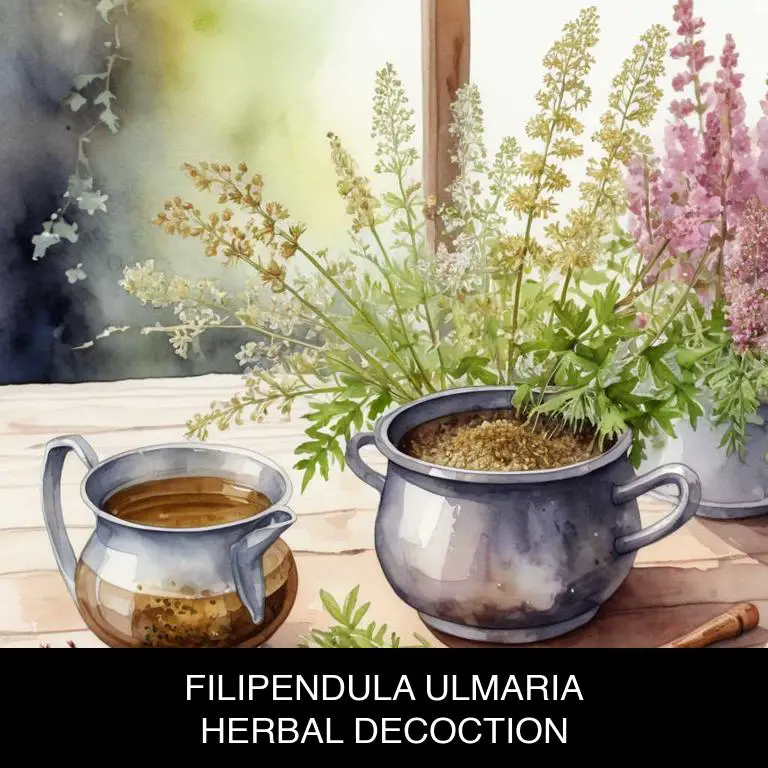
Medicinal Constituents
The list below shows the primary medicinal constituents in Filipendula ulmaria decoctions that help with knee swelling.
- Salicin: Salicin, a phenolic glycoside, acts as a potent anti-inflammatory agent, reducing swelling and pain associated with knee inflammation.
- Quercetin: Quercetin, a flavonoid, has potent anti-inflammatory and antioxidant properties, which help reduce inflammation and oxidative stress in the affected knee area.
- Tannins: Tannins, a type of polyphenol, have anti-inflammatory and astringent properties, which help reduce swelling and inflammation in the knee joint, while also soothing and protecting the surrounding tissues.
Parts Used
The list below shows the primary parts of meadowsweet used to make decoctions for knee swelling.
- Roots: The roots contain a high concentration of salicylic acid, similar to aspirin, which helps to reduce inflammation and relieve pain.
- Leaves: The leaves are rich in flavonoids and tannins, which have anti-inflammatory properties that help to reduce swelling and ease knee pain.
- Stems: The stems of Filipendula ulmaria contain a high amount of mucilages, which have soothing properties that help to reduce inflammation and promote healing in the affected area.
Quick Recipe
The following recipe gives a procedure to make a basic meadowsweet for knee swelling.
- Harvest approximately 30-40 grams of dried filipendula ulmaria roots from a trusted source in early summer.
- Dry the harvested roots in a single layer at room temperature for 1-2 weeks or in a dehydrator at 40 degrees celsius for 8-12 hours.
- Crush the dried roots into a fine powder using a mortar and pestle to increase their surface area.
- Mix 2-3 grams of the crushed root powder with 250 milliliters of boiling water to create a decoction.
- Simmer the mixture for 10-15 minutes and then strain it using a cheesecloth or a fine-mesh sieve to remove the solids.
10. Althaea officinalis
Marshmallow decoctions helps with knee swelling because they provide anti-inflammatory properties that help to reduce the discomfort and pain associated with swollen knees.
The mucilages present in marshmallows create a soothing gel-like substance that coats and calms irritated tissues, thereby reducing inflammation and swelling. Additionally, marshmallow decoctions contain antioxidants that help to neutralize free radicals, which can contribute to knee joint damage and further exacerbate swelling.
By incorporating marshmallow decoctions into one's routine, individuals can experience relief from knee swelling and improved mobility.
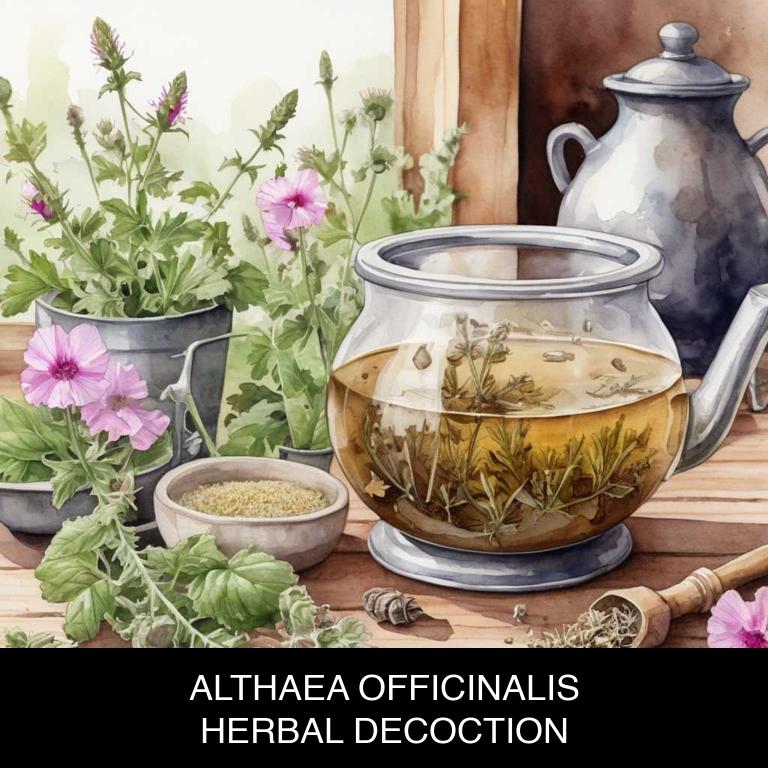
Medicinal Constituents
The list below shows the primary medicinal constituents in Althaea officinalis decoctions that help with knee swelling.
- Mucilages: Mucilages help with knee swelling by forming a protective barrier on the skin and mucous membranes, reducing inflammation and discomfort.
- Gallic acid: Gallic acid has anti-inflammatory and antioxidant properties, which help to reduce knee swelling by inhibiting the production of pro-inflammatory enzymes and free radicals.
- Althaea officinalis polysaccharides: Althaea officinalis polysaccharides have anti-inflammatory and immunomodulatory effects, which help to reduce knee swelling by modulating the immune response and reducing inflammation.
Parts Used
The list below shows the primary parts of marshmallow used to make decoctions for knee swelling.
- Roots: They are rich in mucilage, which helps to reduce swelling and relieve pain.
- Stems: They also contain mucilage, making them a suitable alternative to roots for knee swelling relief.
- Leaves: They possess some mucilage properties, although to a lesser extent than roots and stems, still providing some relief for knee swelling.
Quick Recipe
The following recipe gives a procedure to make a basic marshmallow for knee swelling.
- Gather 2-4 teaspoons of dried althaea officinalis root bark and store it in an airtight container.
- Measure 1 cup of cold filtered water and place it in a medium-sized saucepan.
- Combine the measured water and dried althaea officinalis root bark in the saucepan.
- Heat the mixture over medium heat for 5-10 minutes or until the liquid has reduced slightly.
- Strain the decoction through a cheesecloth or a fine-mesh sieve into a clean container.
What is the best combination of herbal decoctions to use for knee swelling?
The best combination of herbal decoctions that help with knee swelling is a blend of Turmeric, Ginger, and Willow Bark.
Turmeric contains curcumin, a potent anti-inflammatory agent that reduces swelling and pain. Ginger adds its anti-inflammatory properties, while Willow Bark is a natural source of salicylic acid, which helps to reduce pain and inflammation. This combination can be made into a decoction by boiling the herbs in water and straining the liquid before drinking.
It is essential to consult a healthcare professional before using any herbal remedies.
What ailments similar to knee swelling are treated with herbal decoctions?
Ailments similar to knee swelling that are treated with herbal decoctions are conditions characterized by inflammation, pain, and stiffness.
These include arthritis, gout, rheumatism, and fibromyalgia.
Herbal decoctions made from ingredients such as turmeric, ginger, willow bark, and St. John's Wort have anti-inflammatory and analgesic properties that help to reduce swelling and alleviate discomfort in these conditions.